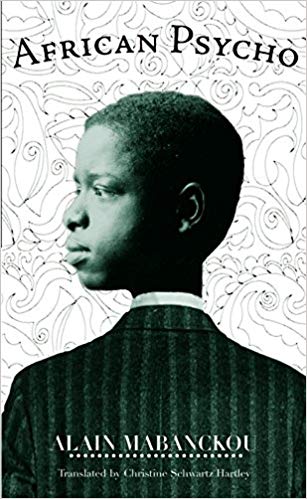The man who can murder as an act of vanity! As an act of self-expression! The narrator of African Psycho expresses the pathology this way: “to kill at last, crush… I was going to exist at last, that’s it, exist… I was going to be somebody.” Such a lunatic yearning is familiar in fiction, a trick that goes back at least to Dostoyevsky. Likewise familiar is the challenge before the protagonist. The drama’s in the waffling: will he or won’t he? Alain Mabanckou’s novel, the first of three of his books to appear in English this year (the Congolese author has won a number of prestigious prizes in France, including the Renaudot), discovers a fascinating new way to hang readers on those tenterhooks. African Psycho presents no gloomy Raskolnikov, nor the fixed sneer of Patrick Bateman, but a haunted burlesque.
The narrator’s name, Gregoire Nakobomayo, may contain a clash of cultures, colonizer and indigenous, but the man proves easy company. An orphan raised largely in the streets of his African metropolis, Gregoire achieved most of his education via a mashup of comic books and “the prestigious titles of the Pleiade collection.”The result is a voluble palooka, likable, with a knack for car repair and a loyalty not to his city or country, which both go unnamed, but to his shanty neighborhood, very much named, in one of the cleverest of the novel’s frequent onomastics: He-Who-Drinks-Water-Is-An-Idiot. He can laugh at his bouts of drinking and masturbation, and get off snappy put-downs, too.
But lately Gregoire’s thinking has turned from the comic to the noir. He dwells on murder and on one murderer in particular, the legendary Angoualima. This name is another shotgun marriage, part French royal family and part Congo River tributary, and so Angoualima holds up a shadowy mirror to Gregoire.
The “Great Master” of killing had magical gifts: “He lived underground because the worm was his totem… he lived at the bottom of the sea because the shark was his totem… he lived in freight trains because… he was able to turn himself into a package….”
The translation, by Christine Schwartz Hartley, locates an effective balance between the mythic “totem” and the mundane “package”; the dilemma for the story is whether its mayhem-minded narrator can achieve the same. Gregoire talks a violent game and he takes instruction from the ghost of his master, yet he can’t stop...
You have reached your article limit
Sign up for a digital subscription and continue reading all new issues, plus our entire archives, for just $1.50/month.
Already a subscriber? Sign in





